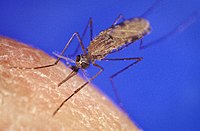
Photo from wikipedia
Antimicrobial peptides (AMPs) are important components of the vertebrate and invertebrate innate immune systems. Although AMPs are widely recognized for their broad-spectrum activity against bacteria, fungi, and viruses, their activity… Click to show full abstract
Antimicrobial peptides (AMPs) are important components of the vertebrate and invertebrate innate immune systems. Although AMPs are widely recognized for their broad-spectrum activity against bacteria, fungi, and viruses, their activity against protozoan parasites has not been investigated in detail. In this study, we tested 10 AMPs from three different insect species: the greater wax moth Galleria mellonella (cecropin A–D), the fruit fly Drosophila melanogaster (drosocin, Mtk-1 and Mtk-2), and the blow fly Lucilia sericata (LSerPRP-2, LSerPRP-3 and stomoxyn). We tested each AMP against the protozoan parasite Plasmodium falciparum which is responsible for the most severe form of malaria in humans. We also evaluated the impact of these insect AMPs on mouse and pig erythrocytes. Whereas all AMPs showed low hemolytic effects towards mouse and pig erythrocytes, only D. melanogaster Mtk-1 and Mtk-2 significantly inhibited the growth of P. falciparum at low concentrations. Mtk-1 and Mtk-2 could therefore be considered as leads for the development of antiparasitic drugs targeting the clinically important asexual blood stage of P. falciparum.
Journal Title: Parasitology Research
Year Published: 2019
Link to full text (if available)
Share on Social Media: Sign Up to like & get
recommendations!